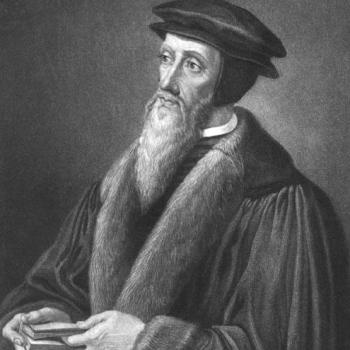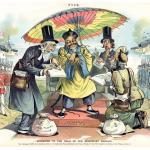
This is an installment of a series of replies (see the Introduction and Master List) to much of Book IV (Of the Holy Catholic Church) of Institutes of the Christian Religion, by early Protestant leader John Calvin (1509-1564). I utilize the public domain translation of Henry Beveridge, dated 1845, from the 1559 edition in Latin; available online. Calvin’s words will be in blue. All biblical citations (in my portions) will be from RSV unless otherwise noted.
Related reading from yours truly:
Biblical Catholic Answers for John Calvin (2010 book: 388 pages)
A Biblical Critique of Calvinism (2012 book: 178 pages)
Biblical Catholic Salvation: “Faith Working Through Love” (2010 book: 187 pages; includes biblical critiques of all five points of “TULIP”)
*****
IV, 12:23-28
***
CHAPTER 12
23. Of the celibacy of priests, in which Papists place the whole force of ecclesiastical discipline. This impious tyranny refuted from Scripture. An objection of the Papists disposed of.
*
In one thing they are more than rigid and inexorable—in not permitting priests to marry. It is of no consequence to mention with what impunity whoredom prevails among them, and how, trusting to their vile celibacy, they have become callous to all kinds of iniquity.
Here we go again with the ludicrous generalities. Sure, there was a lot of corruption in that time. But that calls for reform of the thing (the virtue of celibacy), and spiritual revival, not destruction of a practice good in and of itself, and altogether biblical (1 Corinthians 7).
The prohibition, however, clearly shows how pestiferous all traditions are, since this one has not only deprived the Church of fit and honest pastors, but has introduced a fearful sink of iniquity, and plunged many souls into the gulf of despair.
Anyone who is not called to celibacy should avoid it, and get married. Is this not utterly obvious? Priests are not pressed into service at gunpoint, or involuntarily castrated. One wearies of the continual nonsense that is spouted by Protestants in their detestation of a wonderfully pious practice.
Certainly, when marriage was interdicted to priests, it was done with impious tyranny, not only contrary to the word of God, but contrary to all justice.
All institutions in life have requirements. Why should the Catholic Church be any different? It’s not required of everyone; only those who wish to be priests, by God’s calling.
First, men had no title whatever to forbid what God had left free;
Then why did Calvin rule Geneva with such a dictatorial hand, if he was so intensely concerned with personal freedom?
secondly, it is too clear to make it necessary to give any lengthened proof that God has expressly provided in his Word that this liberty shall not be infringed. I omit Paul’s injunction, in numerous passages, that a bishop be the husband of one wife;
Sure; if a bishop is married at all. He should not be guilty of bigamy or divorce and “remarriage”! That doesn’t mean that the Church has no jurisdiction to require celibacy if she so desires.
but what could be stronger than his declaration, that in the latter days there would be impious men “forbidding to marry”? (1 Tim. 4:3)
Catholics do not forbid anyone to marry, strictly speaking. The Church simply says that she (and not even in its entirety, as Eastern Catholics allow married priests) wishes to draw for her priests exclusively from that portion of men who are already called by God to celibacy (1 Cor 7:17), in order to secure an undistracted devotion to the Lord (1 Cor 7:32, 35). The Church is not approaching a man who wants to be married and forbidding him to do so (i.e., going against his existing vocation and station in life); rather, she is receiving men who voluntarily follow the divine vocation of celibacy and who are voluntarily following a call by God to be priests.
Why this is the least bit controversial has always been a complete puzzle to me. I can only chalk it up to good old prejudice again. It’s a way to lie about and bash the Catholic Church, and it is an emotional subject, so it is used for propaganda, with little regard for reason or biblical rationale. It plays well to the crowds. It’s demagoguery, pure and simple.
Such persons he calls not only impostors, but devils.
Yes, but Calvin simply assumes this is applying to a practice such as that of the Catholic Church, rather than pseudo-ascetic extreme sects like the Manichees and Gnostics and (later) Albigensians and suchlike. The Catholic Church is following the advice of St. Paul in 1 Corinthians 7. If Calvin doesn’t like that, he needs to attack the Apostle Paul directly. That is his burden. Many Protestant commentaries agree with my assessment of 1 Timothy 4:3, over against Calvin’s anti-Catholic fantasies:
The ascetic tendencies indicated by these prohibitions developed earlier than these Epistles among the Essenes . . . who repudiated marriage except as a necessity for preserving the race, and allowed it only under protest and under stringent regulations . . . The prohibitions above named were imposed by the later Gnosticism of the second century. (Marvin Vincent, Word Studies in the New Testament, Grand Rapids, Michigan: Eerdmans, 1980 [originally 1887], Vol. IV, 245)
See Col. 2:16, 21f., where Paul condemns the ascetic practices of the Gnostics. The Essenes, Therapeutae and other oriental sects forbade marriage. In 1 Cor. 7 Paul does not condemn marriage. (A. T. Robertson, Word Pictures in the New Testament, Nashville, Tennessee: Broadman Press, 1931, Vol. IV, 578)
The assertions of these verses are significant when studied in relation to the Gnostic and dualistic views that matter is evil and not created by God. (The Eerdmans Bible Commentary, edited by D. Guthrie et al, Grand Rapids, Michigan: Eerdmans, 3rd edition, 1970, 1173)
We have therefore a prophecy, a sacred oracle of the Holy Spirit, intended to warn the Church from the outset against perils, and declaring that the prohibition of marriage is a doctrine of devils.
We agree, and we deny that this applies to the Catholic position. Calvin — perhaps because of his rush to condemn Catholicism from top to bottom — doesn’t grasp the fundamental distinctions involved.
They think that they get finely off when they wrest this passage, and apply it to Montanus, the Tatians, the Encratites, and other ancient heretics. These (they say) alone condemned marriage; we by no means condemn it, but only deny it to the ecclesiastical order, in whom we think it not befitting.
Much better. This approaches a position of actually understanding that which he opposes.
As if, even granting that this prophecy was primarily fulfilled in those heretics, it is not applicable also to themselves;
But it’s not, because our position (rightly understood) is also St. Paul’s. If Calvin wants to attack it, he should, to be consistent, go after Paul too. But of course he does not. He’d rather play sophistical games.
or, as if one could listen to the childish quibble that they do not forbid marriage, because they do not forbid it to all. This is just as if a tyrant were to contend that a law is not unjust because its injustice presses only on a part of the state.
I repeat: all institutions impose rules and regulations. All organizations have entrance requirements. It is a part of life and reality. The Catholic Church has a perfect right and liberty under God to have this restriction, based on the teachings of St. Paul. I don’t think it is even arguable. This discussion is often conducted on a purely irrational, emotional plane. For those who are interested in a more biblical, reasoned approach, I offer my own numerous papers:
Why Peter’s Marriage Doesn’t Disprove Catholicism: A Dialogue [January 1999]
Clerical Celibacy: Hostile Protestant Commentary & Catholic Replies [2-21-04]
Martin Luther & Antipathy Towards Clerical Celibacy [2-21-04]
Dialogue w a Baptist on Required Clerical Celibacy [7-2-06]
Objections to Clerical Celibacy: In-Depth Dialogue [7-12-06]
Forbidding Marriage? Consecrated Virginity & the Catholic “Both / And” [9-13-17]
Priestly Celibacy: Ancient, Biblical and Pauline [National Catholic Register, 9-18-17]
Priestly Celibacy: Garden-Variety Objections Debunked [9-18-17]
Married Bishops (1 Tim 3) & Catholic Celibacy: Contradiction? [9-18-17; expanded on 6-20-18]
24. An argument for the celibacy of priests answered.
*
They object that there ought to be some distinguishing mark between the clergy and the people; as if the Lord had not provided the ornaments in which priests ought to excel.
St. Paul seemed to think that celibacy was a desired spiritual state, as long as one is called to it. Jesus was single. All of His disciples appear to have been also (Peter seems to have agreed with his wife to separate for the sake of ministry). We treasure celibacy and we treasure marriage (making it a sacrament, whereas Calvin and Luther removed sacramentality from it).
This is the biblical, Pauline, both/and. But Calvin has no place for Paul’s extolling of celibacy for the sake of greater service to the Lord, in his system. So which outlook is more biblical and well-rounded? Is it not utterly obvious? What would Calvin do with, for example, the following passage from the lips of our Lord and Savior Jesus Christ?:
Luke 18:28-20 And Peter said, “Lo, we have left our homes and followed you.” [29] And he said to them, “Truly, I say to you, there is no man who has left house or wife or brothers or parents or children, for the sake of the kingdom of God, [30] who will not receive manifold more in this time, and in the age to come eternal life.”
Why should we Catholics disagree with Jesus? The Catholic Church is not even requiring this much. She doesn’t command a man to leave his wife or children or parents. Rather, she accepts men who have already felt the call or vocation of celibacy. Again, Calvin’s beef is with Jesus Himself, Who sanctioned far more of a “deprivation of liberty” or “imprisoning conscience” than the Catholic Church ever supposedly did.
Thus they charge the apostle with having disturbed the ecclesiastical order, and destroyed its ornament, when, in drawing the picture of a perfect bishop, he presumed to set down marriage among the other endowments which he required of them.
At times there have been married bishops, because this is a disciplinary matter, not a dogmatic one. It’s neither here nor there.
I am aware of the mode in which they expound this—viz. that no one was to be appointed a bishop who had a second wife. This interpretation, I admit, is not new; but its unsoundness is plain from the immediate context, which prescribes the kind of wives whom bishops and deacons ought to have. Paul enumerates marriage among the qualities of a bishop; those men declare that, in the ecclesiastical order, marriage is an intolerable vice; and, indeed, not content with this general vituperation, they term it, in their canons, the uncleanness and pollution of the flesh (Siric. ad Episc. Hispaniar.).
That goes too far, and is not the Catholic position. We have married priests today in the Eastern Rites, and there have been married bishops in the past. Both/and. But Calvinism and general Protestantism sure don’t have much of a tradition of single pastors, do they? They accept one-half of Paul’s teaching and not the other, and this is the problem.
Let every one consider with himself from what forge these things have come. Christ deigns so to honour marriage as to make it an image of his sacred union with the Church. What greater eulogy could be pronounced on the dignity of marriage?
None, but it is irrelevant to the point at hand.
How, then, dare they have the effrontery to give the name of unclean and polluted to that which furnishes a bright representation of the spiritual grace of Christ?
The same way that Jesus Himself (along with Paul) does:
Matthew 19:10-12 The disciples said to him, “If such is the case of a man with his wife, it is not expedient to marry.” [11] But he said to them, “Not all men can receive this saying, but only those to whom it is given. [12] For there are eunuchs who have been so from birth, and there are eunuchs who have been made eunuchs by men, and there are eunuchs who have made themselves eunuchs for the sake of the kingdom of heaven. He who is able to receive this, let him receive it.”
25. Another argument answered.
*
Though their prohibition is thus clearly repugnant to the word of God,
Really? I should think that the truth is clearly quite the opposite, once all the relevant biblical data is examined, and clear thinking brought to bear, rather than irrational emotionalism and a slanderous anti-Catholic motivation.
they, however, find something in the Scriptures to defend it. The Levitical priests, as often as their ministerial course returned, behoved to keep apart from their wives, that they might be pure and immaculate in handling sacred things; and it were therefore very indecorous that our sacred things, which are more noble, and are ministered every day, should be handled by those who are married: as if the evangelical ministry were of the same character as the Levitical priesthood. These, as types, represented Christ, who, as Mediator between God and men, was, by his own spotless purity, to reconcile us to the Father. But as sinners could not in every respect exhibit a type of his holiness, that they might, however, shadow it forth by certain lineaments, they were enjoined to purify themselves beyond the manner of men when they approached the sanctuary, inasmuch as they then properly prefigured Christ appearing in the tabernacle, an image of the heavenly tribunal, as pacificators, to reconcile men to God. As ecclesiastical pastors do not sustain this character in the present day, the comparison is made in vain. Wherefore the apostle declares distinctly, without reservation, “Marriage is honourable in all, and the bed undefiled; but whoremongers and adulterers God will judge” (Heb. 13:4). And the apostles showed, by their own example, that marriage is not unbefitting the holiness of any function, however excellent; for Paul declares, that they not only retained their wives, but led them about with them (1 Cor. 9:5).
Why is 1 Corinthians 7 overlooked throughout the entire section of Calvin’s wrongheaded, unbiblical rantings against celibacy? The Levitical priests offer one analogy, but Calvin neglects to see it based on sweeping bigotry: “ecclesiastical pastors do not sustain this character in the present day.” That’s supposed to be intellectually impressive?
26. Another argument answered.
*
Then how great the effrontery when, in holding forth this ornament of chastity as a matter of necessity, they throw the greatest obloquy on the primitive Church, which, while it abounded in admirable divine erudition, excelled more in holiness. For if they pay no regard to the apostles (they are sometimes wont strenuously to contemn them),
Who is not paying attention? Calvin has ignored 1 Corinthians 7, and he has ignored the fact of Paul’s and the twelve disciples’ celibacy and separation from wives in some cases, for the sake of ministry.
what, I ask, will they make of all the ancient fathers, who, it is certain, not only tolerated marriage in the episcopal order, but also approved it?
Nothing, as it is irrelevant: celibacy being a matter of discipline, not dogma.
They, forsooth, encouraged a foul profanation of sacred things when the mysteries of the Lord were thus irregularly performed by them. In the Council of Nice, indeed, there was some question of proclaiming celibacy: as there are never wanting little men of superstitious minds, who are always devising some novelty as a means of gaining admiration for themselves.
St. Paul’s express teachings are superstitious novelties? That is an odd (beyond bizarre) thing for a Protestant to imply.
What was resolved? The opinion of Paphnutius was adopted, who pronounced legitimate conjugal intercourse to be chastity (Hist. Trip. Lib. 2 c. 14). The marriage of priests, therefore, continued sacred, and was neither regarded as a disgrace, nor thought to cast any stain on their ministry.
They were less conformed to the Pauline model in those days, but that doesn’t mean the Pauline model cannot be followed should the Church decide to make it normative.
27. An argument drawn from the commendation of virginity as superior to marriage. Answer.
*
In the times which succeeded, a too superstitious admiration of celibacy prevailed. Hence, ever and anon, unmeasured encomiums were pronounced on virginity, so that it became the vulgar belief that scarcely any virtue was to be compared to it. And although marriage was not condemned as impurity, yet its dignity was lessened, and its sanctity obscured;
No; only from Calvin’s dichotomous “either/or” mentality does this follow. Catholics think in “both/and” terms.
so that he who did not refrain from it was deemed not to have a mind strong enough to aspire to perfection.
We can strive for perfection in whatever state of life God has called us to.
Hence those canons which enacted, first, that those who had attained the priesthood should not contract marriage; and, secondly, that none should be admitted to that order but the unmarried, or those who, with the consent of their wives, renounced the marriage-bed.
That is, just as Jesus Himself sanctioned (Luke 18:29).
These enactments, as they seemed to procure reverence for the priesthood, were, I admit, received even in ancient times with great applause. But if my opponents plead antiquity, my first answer is, that both under the apostles, and for several ages after, bishops were at liberty to have wives: that the apostles themselves, and other pastors of primitive authority who succeeded them, had no difficulty in using this liberty, and that the example of the primitive Church ought justly to have more weight than allow us to think that what was then received and used with commendation is either illicit or unbecoming.
Scripture itself: the words of our Lord and the Apostle Paul carry as much weight in the scheme of things as the prevailing practices of the early Church (assuming for the sake of argument that it was as Calvin describes).
My second answer is, that the age, which, from an immoderate affection for virginity, began to be less favourable to marriage, did not bind a law of celibacy on the priests, as if the thing were necessary in itself, but gave a preference to the unmarried over the married.
Hence, the Western, Latin Rites in Catholicism take one path, and the Eastern Rites another. Both/and. But Protestantism mostly teaches Only, only. Celibacy is frowned upon, especially in pastors, and this is an unbiblical, un-Pauline attitude.
My last answer is, that they did not exact this so rigidly as to make continence necessary and compulsory on those who were unfit for it. For while the strictest laws were made against fornication, it was only enacted with regard to those who contracted marriage that they should be superseded in their office.
I’m not sure what Calvin means here.
28. The subject of celibacy concluded. This error not favoured by all ancient writers.
*
All good Christians desire such a reform in the clergy and in all Christians; indeed all men, if it were possible.
When they have conceded this, they will next require to be reminded not to represent as necessary that which, being in itself free, depends on the utility of the Church. I do not, however, speak thus as if I thought that on any condition whatever effect should be given to those canons which lay a bond of celibacy on the ecclesiastical order, but that the better-hearted may understand the effrontery of our enemies in employing the name of antiquity to defame the holy marriage of priests. In regard to the Fathers, whose writings are extant, none of them, when they spoke their own mind, with the exception of Jerome, thus malignantly detracted from the honour of marriage.
That’s what I have been contending: Catholics think very highly of marriage!
We will be contented with a single passage from Chrysostom, because he being a special admirer of virginity, cannot be thought to be more lavish than others in praise of matrimony. Chrysostom thus speaks: “The first degree of chastity is pure virginity; the second, faithful marriage. Therefore, a chaste love of matrimony is the second species of virginity” (Chrysost. Hom. de Invent. Crucis.).
Chastity is not confined to the unmarried, because it is ultimately a state of heart and mind.
(originally 9-15-09)
Photo credit: Historical mixed media figure of John Calvin produced by artist/historian George S. Stuart and photographed by Peter d’Aprix: from the George S. Stuart Gallery of Historical Figures archive [Wikimedia Commons / Creative Commons Attribution-Share Alike 3.0 Unported license]
***















